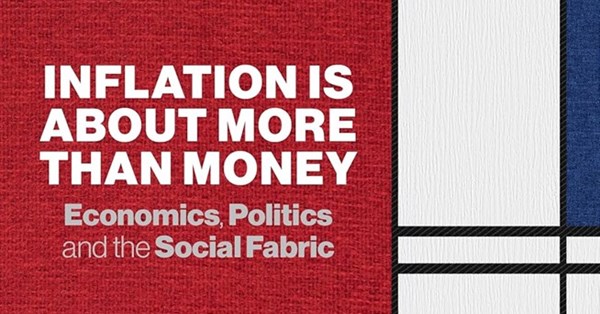“INFLATION is always and everywhere a monetary phenomenon”, says the title of chapter 7; at the same time, it is, as the book’s title affirms, “about more than money”. Those are the two pegs on which the argument of this courteously erudite tract hangs.
Published by the Centre for Enterprise, Markets and Ethics, the initiative inspired by Lord Griffiths to research and advocate for a market with a strong ethical base, the book represents the distillation of his long-held convictions. They have been firmed up in his academic career, as well as through his time on the Court of the Bank of England and his years as the head of Margaret Thatcher’s policy unit.
This is, therefore, a book marked by wide reading, historical perspective, and involvement in the hard task of policy-making. Although the book is not explicitly theological, Griffiths writes as a believer, both personally and in the connections that he makes between his economic subject matter, some of it quite technical, and the needs of society as a whole. This is decidedly a book that tells of “faith in the public square”.
We are plunged straight into inflation as a current issue in the chapter on the effects of “Wars, Covid and Ukraine”, where the pressures that lead to inflationary policies are highlighted. We are also taken into the moral passion behind the book, in a series of chapters on why “inflation is a bad thing”: we read of its costs to the economy and the pressure that it places on the lives of the poorest in society.
But the costs that are even more significant for this author are the moral costs: inflation is a kind of deception, in which what you pay back is not worth what you borrowed, and in which prices cease to function as signals of relative worth. Ultimately, trust is eroded across society, and social cohesion is placed in peril, as the heading of chapter 6 declares: “Things fall apart”.
How does this happen? This happens because “inflation is always and everywhere a monetary phenomenon,” and printing money offers governments (and central banks) a way to avoid really difficult choices. “The case for pragmatic monetarism” describes both diagnosis and prescription. (Do we guess that we are hearing some of the advice that Mrs Thatcher received from her Policy Unit head? Or are we hearing the 1970s voice of Enoch Powell, who once made the trenchant observation that inflation resulted from the behaviour of governments, not the behaviour of anchovies off the coast of South America? But he is not a person to quote, and Griffiths doesn’t.)
To deliver prevention and cure requires central banks and governments to exercise the discipline needed for sound money, and to bear the political cost of doing so.
There are particular reforms that that requires, Griffiths says, such as ensuring that the Bank of England focuses on its prime task, of controlling inflation, and is not diverted into fulfilling all sorts of other fashionable ends, such as supporting aspects of government policy or seeking remedies for climate change. It requires ensuring much more intellectual diversity than Griffiths currently sees in the decision-making committees at the Bank of England. Remedies that have been used in other economies, such as a “debt brake”, also need to be seriously considered.
Yet, Griffiths points out that what policymakers most significantly face are what he calls the “cultural headwinds” that impede the fight against inflation. It is here that we meet Griffiths the person of faith and moral passion: he points to the absence of a unifying moral consensus in society. Here, the language is the nearest that the book approaches to a declaration of the faith that makes it — erudite and even deferential as it is to great figures of economic history — a tract pointing to the loss of the “sacred canopy” over recent decades. Without that overarching and unifying social conviction, the hard choices required to prevent and to counter the lure of inflation, the cheap grace of economic policy-making, will not be made.
Here Griffiths’s tract encounters the questions on which the most important disagreements will appear; for, in the “sacred canopy” from which the author draws his deepest inspiration, the Hebrew prophets and the New Testament Church, we encounter not the canopy of unifying moral perception, but sharp and costly critiques of economies organised at the expense of the most vulnerable. This book describes with great clarity the moral and economic costs of inflation, borne by the poor most of all. Yet, the record of attempts to arrest periods of serious inflation is that the cost is borne by — guess whom — the poor most of all.
Those reading this book will certainly be aware that this is the drama unfolding yet again before our eyes, for all the talk about those with the broadest shoulders bearing the heaviest load. It is the drama of government knowing that inflation is indeed about more than money — but the cure of inflation just as much. When governments declare inflation not just a bad thing, but the worst thing, they effectively weaponise the prevention of inflation to serve political choices that benefit the broad-shouldered as much as they hurt the poorest.
That is the most destructive “cultural headwind”, one that puts disciplining the money of those who have it ahead of ensuring justice for those who don’t.
The Rt Revd Dr Peter Selby is an Honorary Visiting Professor in Theology and Religious Studies at King’s College, London. He is a former Bishop of Worcester, Bishop to HM Prisons, and President of the National Council for Independent Monitoring Boards.
Inflation Is about More Than Money: Economics, politics and the social fabric
Brian Griffiths
London Publishing Partnership £17.99
(978-1-910666-25-8)
Church Times Bookshop £16.19

















